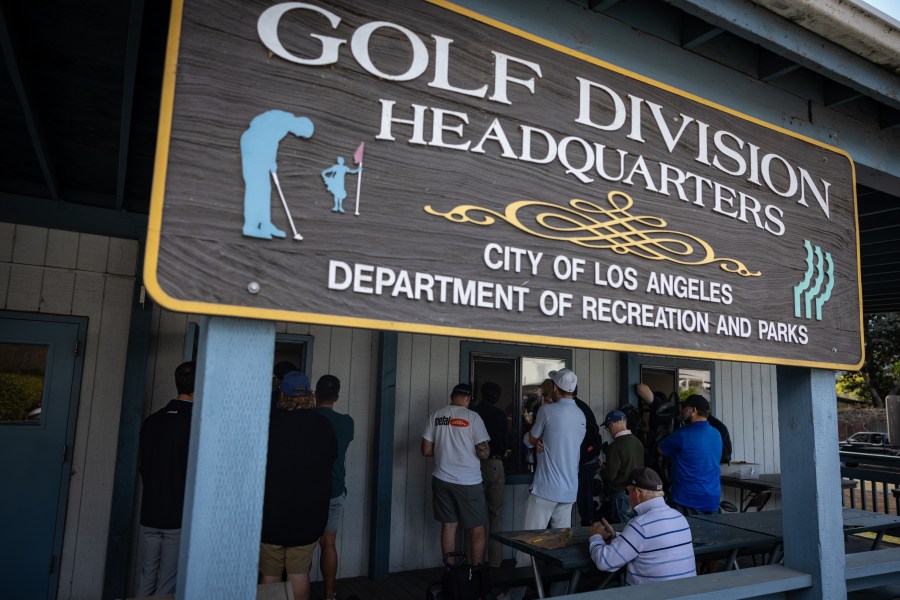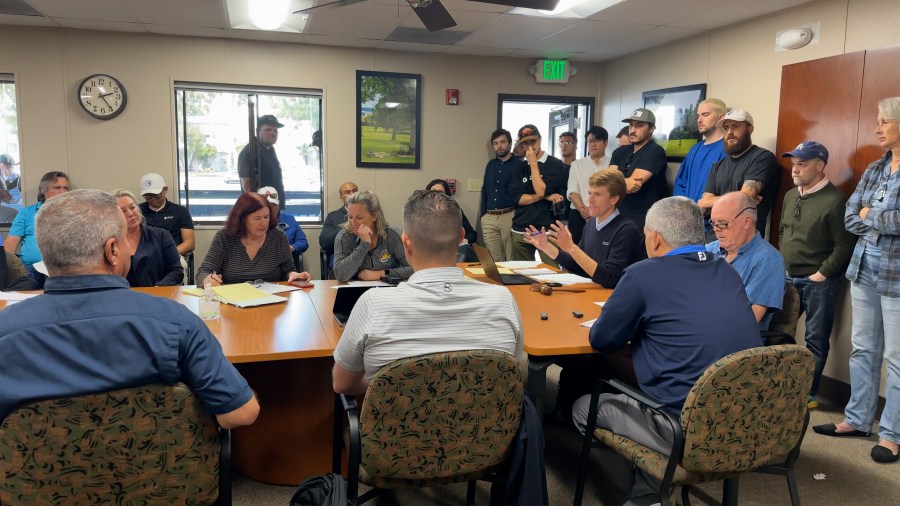The battle over tee times at Los Angeles golf courses continues to brew for the Department of Recreation and Parks and the system it uses for booking reservations.
Last month, five golfers fed up with missing out on tee times filed a class action lawsuit against the city, alleging that reservations are being taken by tee time brokers and automated bots and “nothing has been done to ensure the booking process is fair to all golfers who wish to play.”
Golfers arrived in droves to a March 14 meeting of the Los Angeles Golf Advisory Committee to demand the city take action against the brokers and bots that’ve been scalping times at courses. Board members said that meeting drew the highest attendance they had ever seen.
At the meeting’s conclusion, the committee decided to prepare several internal reports over the coming weeks and assemble a task force to work on a solution to the issue.
The committee last met on April 1 and the minutes have not been released publicly. But on Tuesday, Los Angeles City Golf updated its website, reaffirming that the use of bots to secure reservations was against its booking policy.
“It is prohibited to use any computer program, bot, offline reader, and site search/retrieval application,” the policy reads in part, adding that reservations are being closely monitored to ensure that policy is being followed. If L.A. City Golf determines the policy has been violated, tee times may be canceled and a user may lose their playing privileges.
“Our goal is to make the booking process fair to all golfers who wish to play at our facilities,” the website reads.

The issue over tee time availability at L.A. City Golf courses is not a new one, but has worsened by the those utilizing to technology to abuse the existing honor system.
Many golfers believe brokers have gained early access to the reservation system before anyone else. Even golfers who say they wake up before 6 a.m. on Sundays are finding available times vanish within seconds.
Whether it be the outdated reservation system or the presence of brokers and bots, many golfers have found that tee times are becoming harder to secure than an invite to exclusive parties in the homes above Sunset Boulevard in the Hollywood Hills.
Within the state, courses like Balboa Golf in San Diego have experienced similar issues as recently as February. Bethpage Black, site of major championships like the PGA Championship and the US Open, experienced it as far back as 2009.
Karen Thornton has been on the Griffith Park Advisory board for three years and says the board has been struggling with the issue for months.
She says there needs to be better transparency in the booking process when using the online system.
“The problem is that it’s not equally hard for everyone,” Thornton said. “There aren’t enough golf courses in L.A. and that’s clear.”

In August 2023, members of the Griffith Park Advisory Board hosted Rick Reinschmidt, golf supervisor for the city of Los Angeles to discuss the problems with tee time availability.
When asked about the challenges facing golfers, he said previous vendors used for booking tee times have failed to stop bad actors and bots from beating out actual humans.
“We have tried that with the last three vendors and none can accommodate,” he said at the time. “We are going to work with our next vendor to ensure there is more fairness in the system. We may employ a booking fee as well.”
Reinschmidt added that golfers have launched similar complaints dating all the way back to when he started his position 22 years ago.
But an anonymous city official said those challenges two decades ago are not the same ones facing golfers in 2024.
In addition to automated bots, human brokers have been snagging tee times and selling them at a markup. Many of these brokers communicate use the Korean-based app KakaoTalk to coordinate with potential buyers looking to purchase a time, stonewalling access to golfers who use the system traditionally.
“It’s not one guy bootlegging a couple of tickets,” the official told KTLA. “This is a big deal.”
That same official accused the Department of Recreation and Parks of mismanaging the issue, alleging that solutions have been pitched but none have been implemented.
“They should’ve caught this three years ago,” the anonymous official said. “They’re making an enormous amount of money, and the people of Los Angeles are all getting screwed.”
Just last year, L.A. City Golf’s revenue totaled nearly $30 million with more than $18 million coming from green fees alone, according to the city’s budget.

Golfing in Los Angeles remains lucrative, and although many locals feel like they are missing out, others in the industry pose that it’s simply a question of supply and demand.
A golf retailer in Koreatown, a neighborhood home to a bustling community of golfers that trace their interest in the sport back to as early as 1966, says brokers might be the best option for some.
The retailer, who asked to remain anonymous, worries that eliminating brokers won’t guarantee that reservations end up in the hands of more deserving people. In fact, they say brokers actually play an important role for those who aren’t as tech savvy or well-versed in L.A.’s reservation system.
“If we eliminate the brokers … Will golfers still get the tee times? It works both ways,” the retailer said.
Just last month, that same retailer referred clients to a broker to help them secure a reservation rather than try to navigate the online booking system.
“If I’m traveling from out of town… How else am I supposed to play at L.A. City courses?” they said. “Spend the money and get a faster computer or use a broker.”
They added that these problems aren’t limited to just the golfing industry.
“We’ve had brokers all the time. It’s the same as Dodger Stadium,” they said.
Another option, they said, was to simply show up at the course before it opens and golf without a reservation or paying a fee — something he referred to as the “Rabbit System.”
“You have to play fast,” they said. “Every course has rabbits.”
But others aren’t resigned to the status quo and say there are solutions available now.
Matthew Holder is the CEO of LoopGolf, a booking software that allows golfers to secure times for a transaction fee.
Holder, a native of Palo Alto, says the goal of LoopGolf is to allow golfers more flexibility at some of the busiest courses in the region.
“We’re giving them the ability to recapture a lot of that time in their life,” he said. “We want to make it easier for them to wake up, to go out and enjoy the game they love to play.”
The City of Los Angeles has not contracted with LoopGolf, but Holder hopes a partnership could materialize.
He added that, while he believes using brokers or automated bots to secure tee times is inherently unfair, he doesn’t think there’s one specific way to fix it.
“I think the city of Los Angeles has to look at everything in light of what they’re also doing to determine which is the best path forward,” Holder said, adding that there are plenty of golfers who are happy to pay someone else to secure tee times for them.
The Los Angeles City Golf Advisory Committee is slated to meet again on May 20, and many anxious golfers will be hoping for concrete answers on how to better democratize access to L.A.’s fairways and greens.





















